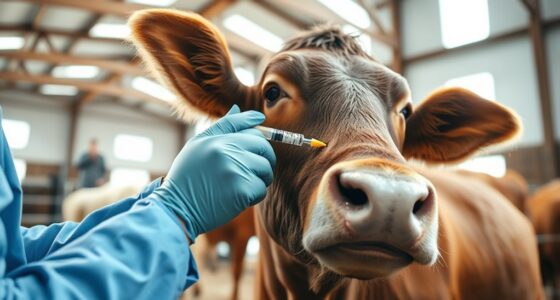Caring for newborn calves is essential for their health and growth. You need to prioritize colostrum feeding—aim for 4 quarts within the first 2 hours—to guarantee strong immunity. Keep maternity pens clean and dry to minimize disease risks. Monitor their growth by tracking weight, heart girth, and overall health. Nutrition is key; provide high-quality starter feed and fresh water. Want to explore more about keeping your calves healthy and thriving? There's plenty more to learn!
Key Takeaways
- Prioritize colostrum feeding, providing 4 quarts within the first 2 hours to ensure effective immunoglobulin absorption.
- Maintain clean and dry maternity pens, and implement strict hygiene practices to minimize pathogen exposure.
- Monitor calf growth by regularly measuring heart girth, wither height, and weight, adjusting nutrition as needed.
- Observe calves closely for health issues, noting signs like lethargy or poor appetite, for early intervention.
- Ensure regular feeding of high-quality calf starter and fresh water to support optimal growth and immunity.
Importance of Newborn Calf Care

Caring for newborn calves is vital because their first hours of life set the stage for their future health and growth. You need to prioritize colostrum feeding, ensuring they receive at least 4 quarts of high-quality colostrum within the first 2 hours. This boosts their immunity and supports healthy calf growth.
Don't forget about navel care; dipping the navel in a 7% tincture iodine solution right after birth will help prevent infections. Keeping maternity pens clean and dry is essential, as it minimizes pathogen exposure.
Finally, monitor your calves closely during their first two months. Early detection of any abnormal signs can greatly improve recovery chances and enhance overall calf management outcomes. Your attention now lays the groundwork for their thriving future.
Essential Colostrum Management

Since the first few hours of a calf's life are crucial, managing colostrum effectively is essential for ensuring their health and immunity.
Effective colostrum management in a calf's early hours is vital for their health and immunity.
You should aim to provide high-quality colostrum, defined as having over 50 g/L IgG and a Brix value of 22 or higher.
Feed your newborn calf 4 quarts of colostrum within the first 2 hours, followed by an additional 2 quarts within 6 to 12 hours. This timing boosts immunity and reduces the risk of disease.
Remember, calves can only absorb immunoglobulins efficiently during this critical window.
Maintain cleanliness during harvesting and feeding to prevent bacterial contamination, which can hinder IgG absorption.
Proper colostrum management is key to your calf's long-term health.
Monitoring Calf Growth and Development
Monitoring your calves' growth is essential for their development.
By tracking heart girth, wither height, and weight, you can assess their progress accurately.
Don't forget that proper nutrition plays a significant role in ensuring they reach their growth targets.
Growth Tracking Methods
Tracking growth in newborn calves is vital to confirm they develop properly and meet breed-specific growth standards. Regularly record heart girth and wither height, and weigh your calves to assess their weight-gain percentage. Graphing this data over time allows you to visualize growth patterns and adjust feeding practices accordingly. It's important to monitor the quality and quantity of high-quality colostrum intake, as it affects the calf's immune health and growth rate. Additionally, introduce high-quality calf starter within the first day and provide fresh water daily.
| Measurement | Frequency | Purpose |
|---|---|---|
| Heart Girth | Weekly | Track growth |
| Wither Height | Weekly | Track growth |
| Weight | Bi-weekly | Assess weight-gain percentage |
| Colostrum Intake | Daily | Confirm adequate nutrition |
Nutrition Impact Assessment
Evaluating the nutritional impact on newborn calves is essential for their growth and overall health.
To guarantee peak development, focus on these key factors:
- High-quality colostrum within the first two hours: Aim for about 10% of the calf's body weight to boost immunity and growth rates.
- Accurate monitoring: Regularly weigh calves and measure heart girth and wither height to track growth and adjust feeding practices as needed.
- Early introduction of feed: Start feeding calves starter feed and provide fresh, clean water daily to prevent growth delays and reduce culling risks.
Preventing Common Calf Diseases

To keep your newborn calves healthy, focus on hygiene and sanitation practices.
Make sure they get high-quality colostrum within the first two hours of life and implement strong biosecurity measures to protect them from disease.
Hygiene and Sanitation Practices
While caring for newborn calves, implementing strict hygiene and sanitation practices is essential in preventing common diseases.
Here are three key steps to keep in mind:
- Calf Pens: Clean and dry calf pens daily. Use a systematic process—soak, scrub with alkaline soap, rinse, and then apply an acid cleaner to eliminate pathogens effectively.
- Sanitizing: Always sanitize your hands, clothes, and equipment before interacting with calves. This reduces the risk of introducing harmful bacteria.
- Bedding: Regularly replace bedding to avoid bacterial growth. Wet, dirty bedding can lead to ammonia buildup, increasing the risk of respiratory illnesses.
Colostrum Management Importance
Proper colostrum management is essential for ensuring the health of newborn calves. High-quality colostrum, with over 50 g/L IgG, provides the necessary immunoglobulin to boost immunity and prevent diseases.
You should aim to feed 4 quarts of colostrum within the first 2 hours after birth, followed by an additional 2 quarts within 6-12 hours. This timely feeding is vital for ideal immunoglobulin absorption.
If you encounter nursing difficulties, remember that unused colostrum can be refrigerated for up to 3 days or frozen for up to 6 months.
Finally, monitor serum protein levels after feeding; achieving a target of over 5.2 g/dL in 90% of calves confirms effective immune transfer and reduces disease risk.
Biosecurity Measures Implementation
Implementing effective biosecurity measures is essential for safeguarding newborn calves from common diseases. A solid biosecurity program minimizes exposure to pathogens and guarantees quality care.
Here are three key steps you should take:
- Sanitize Regularly: Clean your hands, clothes, and equipment frequently, especially during the critical first hours after birth.
- Isolate Sick Calves: Immediately separate any sick calves to prevent the spread of illness. This protects healthy calves and maintains herd health.
- Maintain Maternity Pens: Clean and disinfect maternity pens thoroughly between births to reduce infection risks.
Optimal Feeding Practices for Newborns

When caring for newborn calves, it's essential to prioritize their feeding practices right from the start. Aim to provide at least 4 quarts of high-quality colostrum within the first two hours after birth to guarantee they get the right amount of colostrum for immunity transfer.
A second feeding of 2 quarts should follow within 6-12 hours to boost their immunoglobulin levels and nutrients. After this, introduce milk replacer or whole milk within 12-24 hours for continued support.
Don't forget to offer calf starter feed, like Elite 18% Texturized, on the first day and replace it daily for freshness.
Finally, make sure clean, fresh water is always available to support hydration and overall health in your newborn calves.
Housing Requirements for Healthy Calves
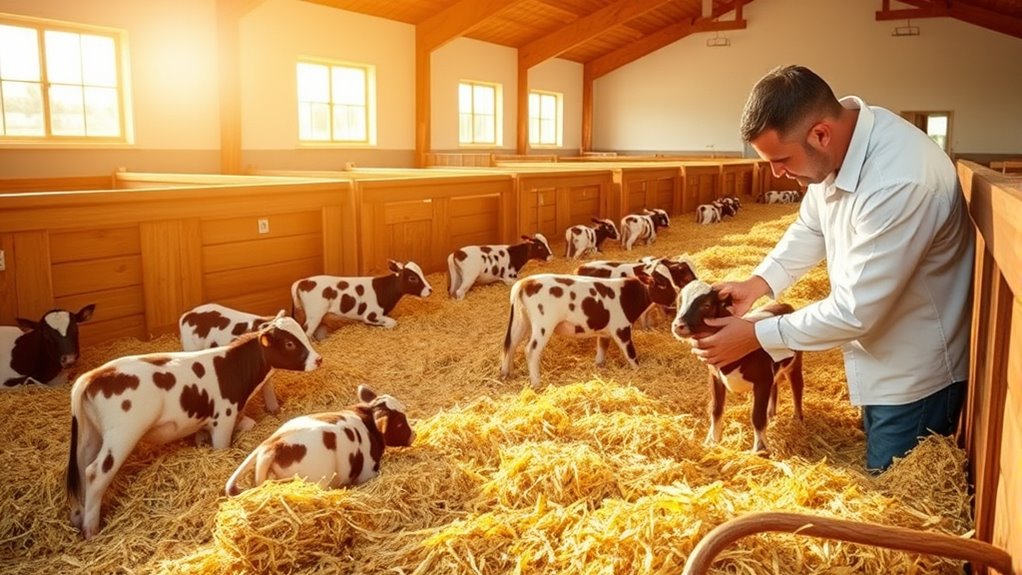
After guaranteeing newborn calves receive ideal nutrition, the next step is to focus on their housing needs. Proper calf housing is essential for their well-being.
Here are three key requirements to keep in mind:
- Ventilation: Guarantee distinct ventilation with an air exchange rate of four changes per hour to maintain a healthy environment and prevent respiratory issues.
- Space: Group calves by age and size in spacious conditions to reduce stress and minimize disease transmission.
- Clean Bedding: Always provide clean and dry bedding to prevent ammonia buildup and respiratory diseases.
Bedding Management for Comfort and Hygiene
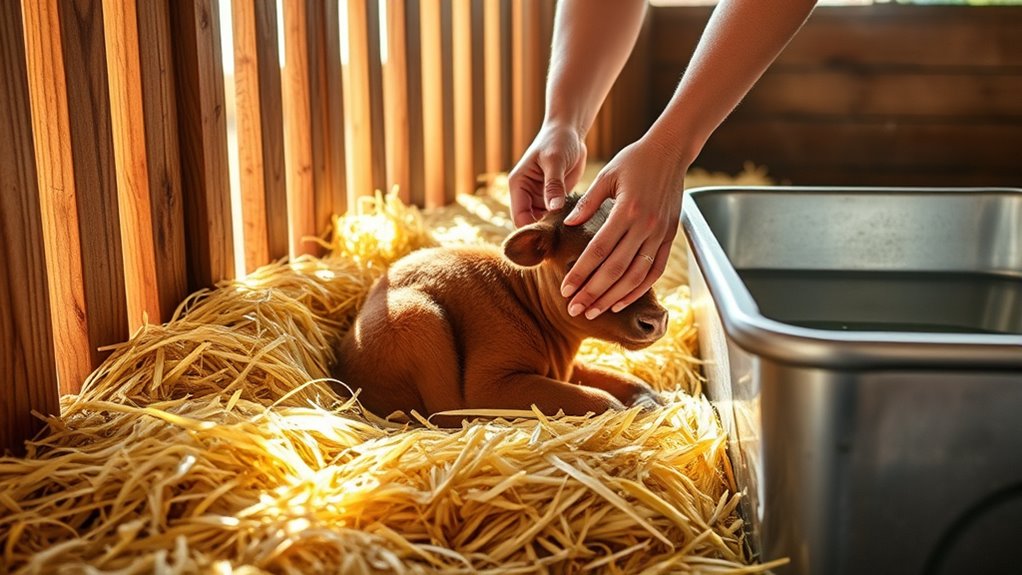
Proper bedding management is essential for guaranteeing your newborn calves remain comfortable and healthy. Clean and dry bedding prevents bacterial growth and reduces the risk of respiratory diseases. Regularly replacing bedding, especially in winter, supports calf health and comfort. A cushioned resting surface minimizes stress and keeps calves clean.
Here's a quick comparison of bedding options:
| Bedding Type | Comfort Level | Disease Risk Reduction |
|---|---|---|
| Straw | Moderate | Good |
| Shavings | High | Very Good |
| Sand | Low | Moderate |
| Recycled Paper | Moderate | Good |
| Wood Chips | High | Very Good |
Effective bedding management guarantees your calves have clean bedding, greatly lowering disease risks and promoting overall well-being.
Creating a Clean and Safe Environment
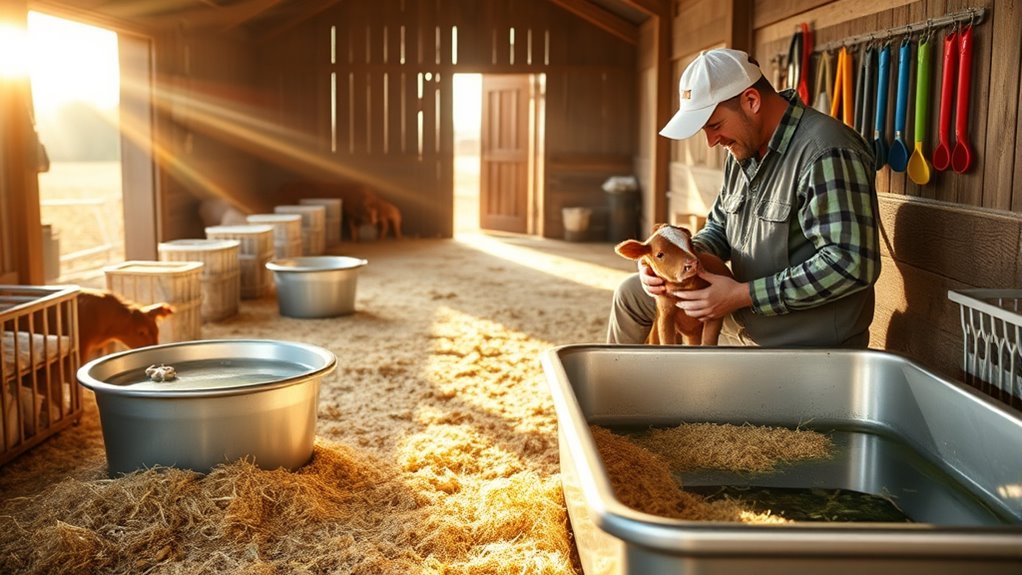
Creating a clean and safe environment for your newborn calves is essential for their health and development.
A clean and safe environment is crucial for the health and development of newborn calves.
By focusing on key practices, you can minimize disease risk in calf housing. Here's what you need to do:
- Maintain Maternity Pens: Keep them clean and dry to prevent infections. Regularly remove waste and soiled bedding.
- Implement a Cleaning Process: Systematically clean calf housing by soaking, scrubbing with alkaline soap, rinsing, and using an acid cleaner to eliminate harmful organisms.
- Ensure Proper Ventilation: Make sure your housing has an air exchange rate of at least four changes per hour to maintain a clean environment and reduce respiratory issues.
Identifying Health Issues in Newborn Calves
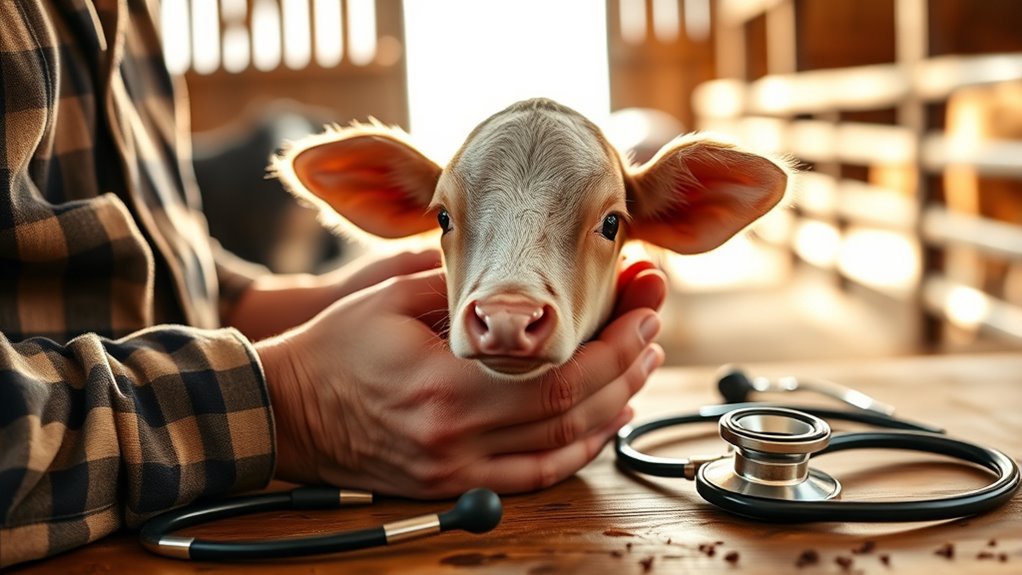
Identifying health issues in newborn calves is vital because early detection can greatly enhance their recovery chances. During the first few hours of life, you must closely monitor calf health.
Look for signs like lethargy, poor appetite, abnormal breathing, diarrhea, and unusual vocalizations—these require immediate attention. Maintaining a detailed record of each calf's health, including their vaccination program and colostrum intake, helps spot patterns that may indicate potential issues.
Proper care of the newborn, including good nutrition and clean housing, plays an essential role in preventing diseases. By being proactive and vigilant, you can guarantee your calves thrive during this critical period, markedly improving their chances of a healthy future.
Frequently Asked Questions
What Are the 5 C's of Calf Care?
When it comes to calf care, you'll want to focus on the 5 C's: Colostrum, Cleanliness, Comfort, Care, and Consultation.
Make certain your calves get high-quality colostrum right after birth to boost immunity.
Keep their environment clean and dry to prevent disease.
Guarantee proper ventilation and temperature for comfort.
Monitor their health closely and provide individual attention.
Finally, consult nutrition experts to create a tailored feeding plan that supports their growth and health.
How to Take Care of a Newborn Baby Calf?
Caring for a newborn calf is like nurturing a fragile flower; it needs the right conditions to thrive.
Start by ensuring it drinks 2 liters of high-quality colostrum within the first two hours. Dip its navel in iodine to prevent infections and move it to a clean area.
Keep an eye on its health and maintain cleanliness. By providing fresh water and quality feed from two weeks, you'll help it flourish.
What Is the 321 Rule for Calves?
The 321 Rule for calves is essential for guaranteeing their health.
It means you should provide 3 liters of high-quality colostrum within the first 2 hours of the calf's life.
Then, you'll want to give another 1-2 liters within 12 hours.
This helps guarantee the calf receives the necessary immunoglobulins to build its immune system.
What Is the First Priority in Caring for a Newborn Calf?
What's the most critical step in caring for a newborn calf? Your first priority should be to guarantee it receives high-quality colostrum within the first two hours of life.
Aim for about 4 quarts to deliver essential immunoglobulins that boost its immunity. This early nutrition sets the foundation for strong health.
Don't forget immediate navel care and cleaning its nostrils and mouth; these actions help prevent infections and breathing issues.
Conclusion
Caring for newborn calves is essential for their health and future productivity. By ensuring they receive adequate colostrum, proper nutrition, and a clean living space, you lay the foundation for strong, thriving animals. For instance, a farmer who implemented a strict colostrum management plan saw a 30% decrease in disease incidence among his calves. Remember, investing time in their early care pays off in healthier, more productive cattle down the road.






